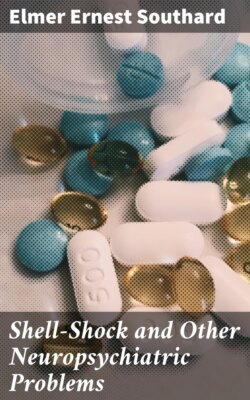Читать книгу Shell-Shock and Other Neuropsychiatric Problems - Elmer Ernest Southard - Страница 98
На сайте Литреса книга снята с продажи.
ОглавлениеDesertion by alcoholic. Contributory factors.
Case 92. (Kastan, January, 1916.)
Carl B. was a soldier about whom the captain thought that his intellectual power had been weakened by drink. An inquiry after arrest showed that he had been odd also at home. He had once been sued for perjury, but the suit had been stopped for lack of evidence. He had been several times convicted of drunkenness. It appears that on March 30, 1915, after mounting guard, he said nothing and went home, remaining at home until the next day and then returned to the guardhouse in the street-car. He declared, this time, that the non-commissioned officer had given him permission to leave, although this statement was not correct.
Again, on April 6, B. was about to leave the quarters, but the surgeon, finding him drunk, kept him back. He did not go home that night, and the next day when he was wanted at the hearing, he could be found only in the afternoon. He replied confusedly and somewhat irrelevantly to the questions asked. On arrival at the clinic he was in tears and much depressed. Given 50 grams of alcohol, he became somewhat livelier. Upon examination, his perceptions were found diminished; he felt, he stated, a cracking and crackling in his neck. In his cell he had felt as if sparrows were roosting in his face; he had heard voices and seen pictures, and had not known what he was doing. He asserted his innocence, blaming his imprisonment for all his troubles. He had been in the habit of drinking three liqueurs and two glasses of beer a day. He had been drawing a pension since a fall from a scaffold.
A sister had suffered from continual headaches. The patient himself had three sickly children and ten of his children were dead; there were also two premature births.
The analysis of this case would clearly show the benefit of considering, first, the hypothesis of syphilis. Not only is the history of his children suggestive, but the impairment of mind noted by the captain as due to alcohol may very possibly be syphilitic in origin. Examples in division he could not solve, and it is a question whether his leaving guardmount is not in part related to disorientation for time. There appears to be no evidence of feeblemindedness and none of epilepsy (though a sister suffered from continual headaches). Alcohol may account possibly for the entire picture and is particularly consistent with the false voices and figures, the sparrows in the face, and the sensations in neck and the tickling in the ears. It is possible, also, that intolerance to alcohol had set in since the fall from the scaffolding for which a pension was being received. It does not appear necessary to consider any further of the groups of mental disease. Syphilis, alcohol, and a post-traumatic brain condition, all may play a part. Alcohol is able probably by itself to produce a number of these symptoms, and these alcoholic symptoms would be probably the more readily produced in virtue of the post-traumatic intolerance that we may assume.
